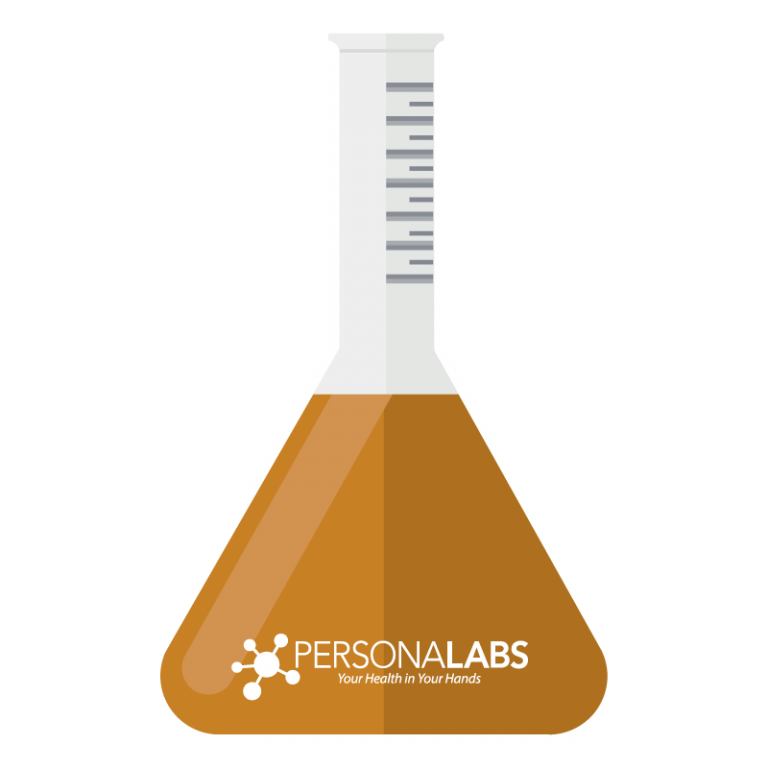- Fast results
- 4,000+ locations
- 4.8 star rating
Need Help? (888) GET LABS

* This is not a home test kit. You will need to visit a local lab for testing.
Fasting Required: No
Turnaround Time: 2-7 business days
Specimen Type: Blood
GGTP, Gamma-GT Test, Gamma-Glutamyl Transpeptidase, and GTP test
A gamma-glutamyl transferase (GGT) blood test assesses liver health and detects liver, bile duct, and bone disease. In some cases, it is also used to monitor alcohol consumption and substance abuse as part of rehabilitation or treatment. Elevated levels of this enzyme can signal liver injury or other underlying pathology, particularly when linked with conditions such as alcoholic hepatitis, hepatitis, steatohepatitis, or metabolic syndrome.
The gamma GT test screens for gamma-glutamyl transferase – a type of enzyme that could suggest liver problems if found in high amounts.
An elevated GGT alone may not be enough to diagnose liver problems, as it could also be caused by problems in the bile duct and bone disease. Therefore, additional lab tests, like the bilirubin test, albumin blood test, and other liver function tests, might be requested by your healthcare provider.
People who are obese, have type 2 diabetes, and drink alcohol heavily, should consider taking a GGT blood test as part of their annual checkup.
Liver problems don’t often show early signs and can only be detected through regular checkups and testing before developing complications. For this reason, it is typically run as part or along with the hepatic function panel.
On the other hand, your doctor will most likely order the test if you observe symptoms of liver problems such as the following.
As GGT levels decrease after a meal, fasting for at least eight hours is necessary before your blood test. Venipuncture will be used to draw a blood sample. You may also be advised to avoid alcohol, specific medications (such as phenytoin, phenobarbital, or birth control), and certain foods or vitamins that affect lipid and protein metabolism. Fasting ensures a clearer picture of your liver’s condition and metabolic state.
The test value for GGT should not exceed 65 IU/L for males and 60 IU/L for females. Otherwise, it is considered abnormal.
An increased gamma-glutamyl transferase suggests liver problems linked to chronic illnesses such as liver disease, hepatic cancer, and cholestasis during pregnancy.
To further assess your liver function, your doctor may run other tests, such as alkaline phosphatase (ALP), alanine aminotransferase (ALT), and aspartate aminotransferase (AST) blood tests.
You can take the Gamma GT blood test by following these steps.
Step 1: Go to our website and search for the gamma-glutamyl transferase (GGT) blood test. Once you order the test, you can download the lab test order, which serves as your doctor’s order for your lab work.
Step 2: Choose a partner medical center using our lab locator.
Step 3: Visit the laboratory you chose to have your blood collected.
Step 4: Expect the lab test results within 2-10 business days in your Personalabs account.
For an exact turnaround time for results, please contact us at 1-888-438-5227. We will contact the lab of your choice (Quest Diagnostics or LabCorp) as turnaround times vary depending on testing location or lab testing provider.
| Provider | LabCorp, Quest |
|---|

Order Your Test
Create an account, choose your tests, checkout securely, generate your lab order

Generate & Print Out Lab Order
Our physician network will approve your order within 2-4hrs.

Visit the Lab
The test price decides which lab you will visit: Quest or Labcorp. Find a location in your area.

Get Your Results
Results can be provided in as little as 24-48 hrs. For more complex tests, please contact us for turn around times.
Based on 2,273 reviews subject to moderation
Have used in the past to check things for myself
Review of 5/28/2025, reflecting an experience on 5/25/2025 by Mark L
P Labs is my go to! Good value, great service
Review of 5/23/2025, reflecting an experience on 5/12/2025 by Waylon C
I appreciated the quick turnaround from the time I ordered the laread more
Review of 5/16/2025, reflecting an experience on 5/14/2025 by Patricia S
ALWAYS AN AWESOME JOB
Review of 5/16/2025, reflecting an experience on 5/13/2025 by john P
I use them faithfully. An Excellent service! I great way to manaread more
Review of 5/15/2025, reflecting an experience on 5/12/2025 by Suzanne T
The online test signup was easy, Quest office wait time was minimread more
Review of 5/14/2025, reflecting an experience on 5/11/2025 by Alan W
The reception was very attentive and warm, very fast and professiread more
Review of 5/12/2025, reflecting an experience on 5/9/2025 by Royce S
Easy to order, quick delivery of order. Prices good whe coupons oread more
Review of 5/12/2025, reflecting an experience on 5/8/2025 by Susan G
makes it easy to manage my health without having to talk to a docread more
Review of 5/10/2025, reflecting an experience on 5/7/2025 by Patrick C
Ordered a test by mistake (no lab order generated) and wasn't fulread more
Review of 5/2/2025, reflecting an experience on 4/14/2025 by Sheri K
Went smoothly
Review of 5/2/2025, reflecting an experience on 4/18/2025 by Frederick J
I live in Massachusetts where most of medical procedures are goveread more
Review of 5/2/2025, reflecting an experience on 4/16/2025 by Helen M
Always quick.
Review of 5/2/2025, reflecting an experience on 4/24/2025 by Joshua T
Easy to find my tests, order, sample, and prompt return of the reread more
Review of 4/19/2025, reflecting an experience on 4/14/2025 by Steven M
Good , but nothing listing what you’re charging for what differenread more
Review of 4/19/2025, reflecting an experience on 4/3/2025 by Rodnet J
Have used in the past to check things for myself
Review of 5/28/2025, reflecting an experience on 5/25/2025 by Mark L





© Copyright 2025 Personalabs. All Rights Reserved.
Good , but nothing listing what you’re charging for what differenread more
Review of 4/19/2025, reflecting an experience on 4/3/2025 by Rodnet J